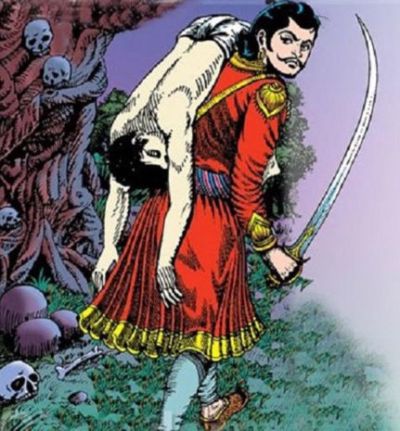“I may have done a lot of bad deeds in my life, but I want to make up for at least a part of it by doing this…once I get married to your daughter, I will give her permission to have a son from any other man, and whosoever be the father, I will be the father as well.”
“And that is why I ask her hand in marriage, and I beseech you to heed this request and last wish of mine.”

आनीय च कुतो ऽप्य् अम्बु पाणौ चौरस्य तस्य सा ।
एषा सुता मया तुभ्यं कन्या दत्तेत्य् अपातयत् ॥ १२,२६.२३ ॥
सो ऽपि तद्दुहितुर् दत्तयथोक्ताज्ञो जगाद ताम् ।
गच्छामुष्य वटस्याधः खात्वा स्वर्णं गृहाण तत् ॥ १२,२६.२४ ॥
गतासोर् दाहयित्वा मे देहं युक्त्या विसृज्य च ।
अस्थीनि तीर्थे ससुता गच्छेर् वक्रोलकं पुरम् ॥ १२,२६.२५ ॥
तत्र सूर्यप्रभे राज्ञि सौराज्यसुखिते जने ।
निरुपद्रवनिश्चिन्ता स्थास्यसि त्वं यथेच्छसि ॥ १२,२६.२६ ॥
इत्य् उक्त्वा तृषितः पीत्वा तयैवोपहृतं जलम् ।
शूलव्यधव्यथोत्क्रान्तजीवश् चौरो बभूव सः ॥ १२,२६.२७ ॥
Hiraṇyavatī thought for a while, and her greed got the better of her. She replied…
“Ok. I consent. Wait, I will be back.”
She then went across to the nearby pond and brought some water back with her. Pouring it on the thief’s palms, she said…
“I give my daughter in marriage to you.”
The thief then looked at Dhanavatī and said…
“I now give you my consent to have a child through another man.”
He then turned back to Hiraṇyavatī and said…
“There is a banyan tree one hundred yards from here, next to the pond and on the edge of the forest. At the foot of the tree lie buried one thousand gold coins. You can take them all.”
“When I die, please arrange for my body to be cremated and my ashes immersed in the Gangā. You can then take your daughter and go to the city of Vakraloka.”
That city is governed by Sūryaprabha, who is an able administrator. His subjects live there happily. You can start a new life there…”
The thief then drank some of the water that Hiraṇyavatī had brought back with her, and then, unable to bear the pain anymore, died on the very spot.
ततो गत्वा वणिक्स्त्री सा स्वर्णं वटतरोस् तलात् ।
गृहीत्वा ससुता गुप्तम् अगाद् भर्तृसुहृद्गृहम् ॥ १२,२६.२८ ॥
तत्र स्थित्वा च युक्त्या तद् दाहयित्वा कलेवरम् ।
चौरस्य तस्य तीर्थे ऽस्थिक्षेपादिकम् अकारयत् ॥ १२,२६.२९ ॥
अन्येद्युश् चात्तगुप्तार्था ततो निर्गत्य सात्मजा ।
प्रयान्ती क्रमशः प्राप सा तद् वक्रोलकं पुरम् ॥ १२,२६.३० ॥
तत्रैकं वसुदत्ताख्याद् गृहं क्रीत्वा वणिग्वरात् ।
तस्मिन्न् उवास सुतया धनवत्या तया सह ॥ १२,२६.३१ ॥
तदा च तत्रोपाध्यायो विष्णुस्वामीत्य् अभूत् पुरे ।
मनःस्वामीति तस्यासीच् छिष्यो विप्रो ऽतिरूपवान् ॥ १२,२६.३२ ॥
विध्याभिजनयुक्तो ऽपि स यौवनवशीकृतः ।
तत्र हंसावलीं नाम वाञ्छति स्म विलासिनीम् ॥ १२,२६.३३ ॥
सा च सौवर्णदीनारशतपञ्चकम् अग्रहीत् ।
भाटिं तस्य च तन् नाभूद् व्यषीदत् तेन सो ऽन्वहम् ॥ १२,२६.३४ ॥
Hiraṇyavatī then went looking for the gold – surely enough, she found it buried at the foot of the banyan tree, just as the thief had said.
She then went to the house of a close friend of her husband, and with his help, she cremated the thief’s body and arranged for his ashes to be immersed in the Gangā.
Once done, she set out for Vakraloka.
When she reached the magnificent city, she located the house of a merchant named Vasudatta, and through him, arranged to buy a house in the city, where she started to live with her daughter.
In the same city, and incidentally in the same lane, lived a guru by the name of Viṣṇusvāmin. He had a shishya, a handsome Brāhman named Manaḥsvāmin.
Even through Manaḥsvāmin was of high birth, and well-educated, he was so bound by his desires that he fell in love with a courtesan named Hamsāvalī. She knew his desperation, and so demanded a fee of five hundred gold coins for him to see her and spend time with her.
Manaḥsvāmin could not afford such a pricey sum, and hence spent his days dejected and depressed.
One day, when Dhanavatī was standing on the terrace of her house…
to be continued…
